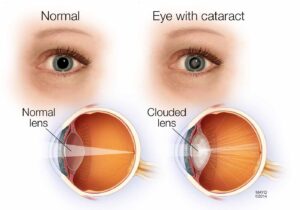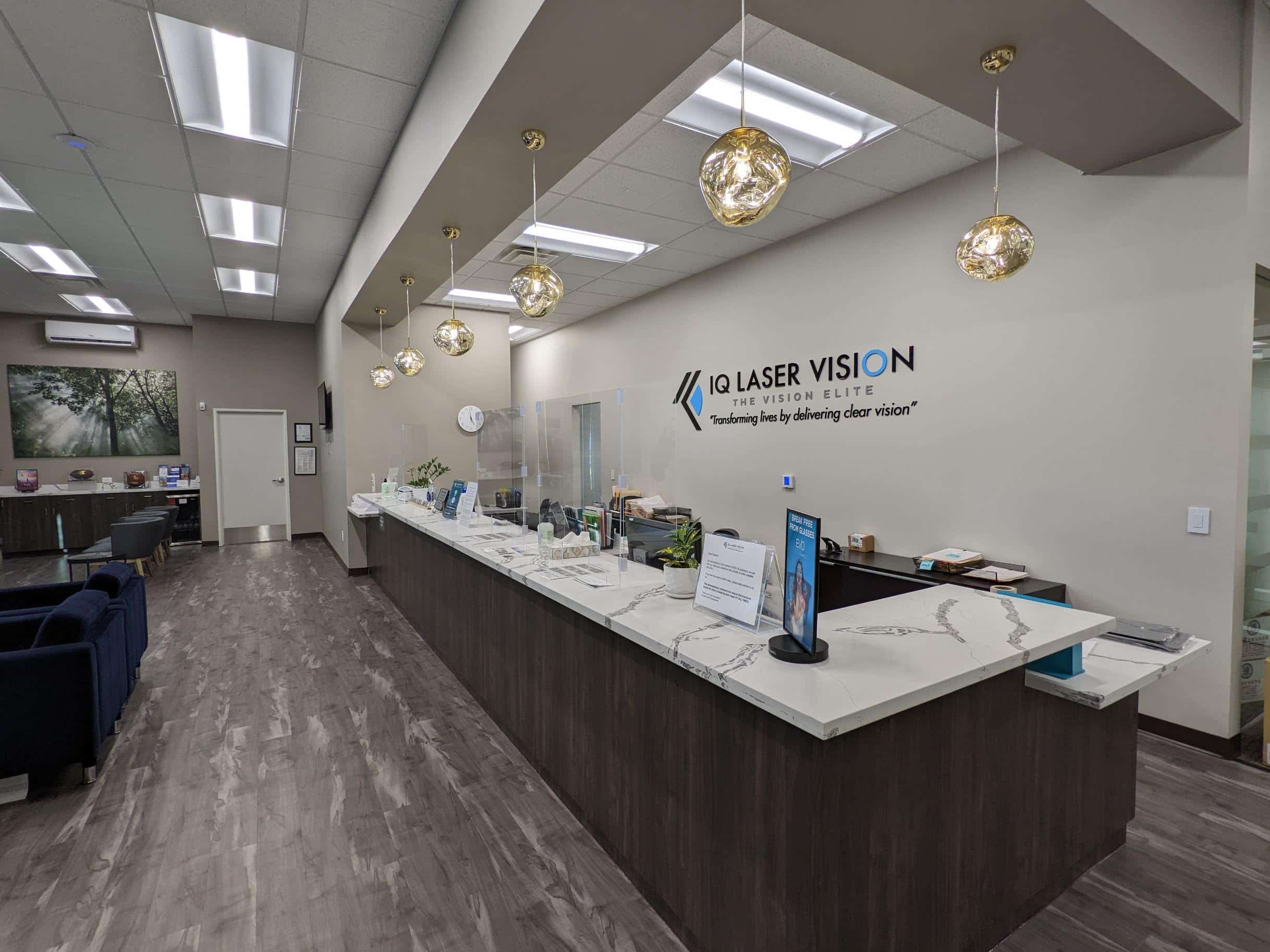Did you know that June is Cataract Awareness Month as declared by Prevent Blindness? Cataracts are the leading cause of blindness in the world.
They even make up about 42% of all cases of blindness around the world, with 25 million Americans estimated to have a cataract. Prevent Blindness uses this month as a way to educate the public about cataracts, as well as how to treat them with cataract surgery.
Keep reading to learn how you can get informed during Cataract Awareness Month!
What are cataracts?

An important place to start when you’re trying to be more informed about cataracts is to learn what they are. So what is a cataract?
A cataract is what occurs when the natural lens of the eye becomes cloudy. When the lens gets cloudy, this leads to vision distortion, along with other frustrating symptoms like double vision, light sensitivity, glare, and difficulty driving at night.
These are only some of the symptoms that you may experience if you have a cataract. The most common reason that someone will develop a cataract is due to aging but it is not the only reason. Other reasons may include:
- If you have diabetes
- If you suffer from any eye diseases or have had any eye injuries
- You’re a smoker
- You’ve spent a lot of time in the sun without using proper eye protection
- Long-term steroid or corticosteroid use

Although there is no way to guarantee that you’ll never develop cataracts, there are things that you can do to reduce your risk of developing them at an earlier age. The best thing you can do?
Lead a healthy lifestyle! Many of these risk factors can be mitigated with a balanced diet, staying active, and building healthier habits. Following these recommendations can help reduce your chances of developing a cataract at an earlier age but for most people, developing cataracts is a normal part of aging.
Cataract Awareness Month: How do you treat cataracts?
Although cataracts are the leading cause of vision loss in the world, there is an effective way to treat them. By having cataract surgery, patients have their natural lens removed and replaced with an artificial lens.
The artificial lens, known as an intraocular lens or IOL, takes over the job that the natural lens was once performing well until it became a cataract.
Having cataract surgery is the only way to treat cataracts. Even if you find out you have a cataract, you may not need to have cataract surgery right away.
This is because cataracts can take years or even decades to fully form! You could have a cataract that begins developing in your forties or fifties that doesn’t affect your vision for many years.
Most cataract surgeons will only recommend cataract surgery once you become unable to do everyday things, like cooking, cleaning, or even seeing the television. They may also recommend it if you start falling down or injuring yourself because you can’t see. However, it is possible to remove the lens prior to significant suffering and fix your prescription at the same time. This is often not covered by insurance.
Choosing an IOL before cataract surgery
One of the most important parts of cataract surgery actually happens before the procedure. This involves choosing an IOL before cataract surgery.
If that sounds like a lot of pressure, don’t worry! You won’t have to make this decision on your own. It’s a decision that you and your ophthalmologist will make together based on your visual goals and lifestyle needs after cataract surgery.

You’ll need to take some things into account, like, do you want to reduce your dependence on glasses after cataract surgery? Are you active and looking for an intraocular lens that will allow you to have more freedom when you do things like play golf or tennis?
If these are things that you find important, anintraocular lens that allows you to see far, intermediate and near with less dependence on glasses be the best option for you. You may hear them called many different names including premium IOL, advanced technology IOL or presbyopia-correcting IOL.
In many cases, you’ll end up with the best-uncorrected vision of your life, even before you had cataracts! At IQ Laser Vision, we offer our patients the following IOLs:
Multifocal IOLs
With a multifocal IOL, you’ll be able to see well at a variety of distances, including up close, far away, and intermediate distances. This lens will reduce your dependence on glasses after cataract surgery.
The tradeoff is that you may see more glare than other lenses and contrast may be decreased. We offer all the FDA-approved types of these lenses and will choose the best one for you based on your own anatomy and lifestyle needs.
Toric IOLs
If you have astigmatism, the best kind of lens may be a toric IOL. Toric IOLs are the only intraocular lens that’s specifically designed for people with astigmatism.
If you have astigmatism, it means that your eye is not perfectly round. With astigmatism, your eye will be more of a football shape, rather than a rounder basketball shape.
Toric IOLs only have one focus distance so you may still need glasses for near vision but are a great choice for people who want to minimize dependence on glasses but aren’t good candidates for multifocal lenses.
Cataract Awareness Month: Should I be worried about cataracts?
Cataracts can sound scary, but they’re not! If you’re nervous about them, remember that leading a healthy lifestyle can help if you want to reduce your risk of early development!

Another thing that’s important is scheduling annual dilated eye exams. This becomes crucial if you’re 40 or older.
Dilated eye exams are a must because they allow your eye doctor to look at your optic nerve and retina. During this exam, they’ll look for any signs of disease, and if you have any cataracts.
If you do have a cataract, seeing your eye doctor regularly will let them monitor your cataract as it develops and make it easier to know when you should start considering cataract surgery.
Have questions about cataracts or how you can keep your eyes safe during Cataract Awareness Month? Schedule a cataract screening at IQ Laser Vision in locations throughout California and Houston, TX.























